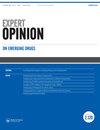治疗肝细胞癌的新兴药物
IF 2.7
3区 医学
Q2 PHARMACOLOGY & PHARMACY
引用次数: 4
摘要
肝细胞癌(HCC)仍然是肝脏相关死亡的主要原因。任何病因的肝硬化都是HCC的主要危险因素,尽管乙型肝炎患者可以在无肝的情况下发生HCC,非酒精性脂肪性肝病患者也越来越多地发生HCC。如果在早期发现,治疗方案包括手术切除、肝移植和/或消融治疗。不幸的是,大多数HCC病例在晚期才被发现,此时选择有限且无法治愈。然而,酪氨酸激酶抑制剂和免疫疗法的新的全身疗法扩大了晚期HCC的治疗选择。全身治疗的进步给晚期HCC患者带来了希望,延长了他们的生存期。我们讨论了最近的数据和正在进行的研究工作,以改善肝细胞癌的治疗,并讨论了当前和即将进行的系统治疗,结合不同类别的药物。专家意见:肝癌的全身治疗仍在发展中。将免疫治疗纳入全身治疗已经彻底改变了HCC的治疗领域。确定适当的全身治疗组合和顺序,再加上发现可靠的HCC生物标志物,将提高生存率和个体化HCC治疗。本文章由计算机程序翻译,如有差异,请以英文原文为准。
Emerging drugs for the treatment of hepatocellular carcinoma
ABSTRACT Introduction Hepatocellular carcinoma (HCC) remains a leading cause of liver-related mortality. Cirrhosis of any etiology is the major risk factor although HCC can develop in its absence in patients with hepatitis B and increasingly in those with nonalcoholic fatty liver disease. When detected at an early stage, curative options include surgical resection, liver transplantation, and/or ablative therapies. Unfortunately, most cases of HCC are recognized at an advanced stage when options are limited and noncurative. However, new systemic therapies with tyrosine kinase inhibitors and immunotherapy have expanded therapeutic options in advanced HCC. Advances in systemic therapy have given patients with advanced HCC hope and prolonged their survival. Areas covered We discuss recent data and ongoing research efforts to improve the treatment of hepatocellular carcinoma with discussion of current and upcoming systemic therapies combining agents of different classes. Expert opinion Systemic therapy for HCC is in evolution. The inclusion of immunotherapy to systemic therapy has revolutionized the field of HCC treatment. Identification of the appropriate combination and sequence of systemic therapy coupled with discovery of reliable HCC biomarkers will lead to improved survival and individualized HCC therapy.
求助全文
通过发布文献求助,成功后即可免费获取论文全文。
去求助
来源期刊
CiteScore
5.90
自引率
0.00%
发文量
28
审稿时长
>12 weeks
期刊介绍:
Expert Opinion on Emerging Drugs (ISSN 1472-8214 [print], 1744-7623 [electronic]) is a MEDLINE-indexed, peer-reviewed, international journal publishing structured reviews on Phase II and Phase III drugs/drug classes emerging onto the market across all therapy areas, providing expert opinion on their potential impact on the current management of specific diseases.

 求助内容:
求助内容: 应助结果提醒方式:
应助结果提醒方式:


